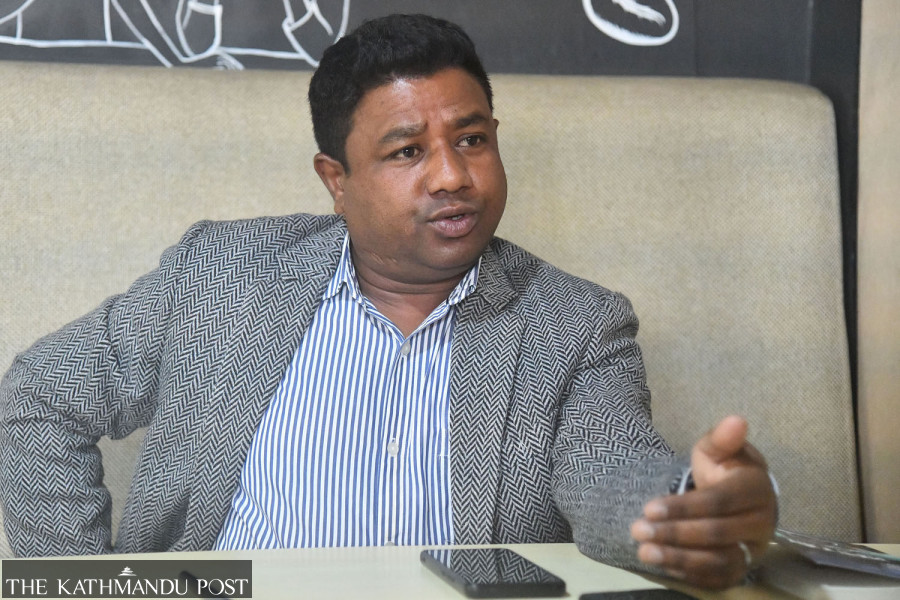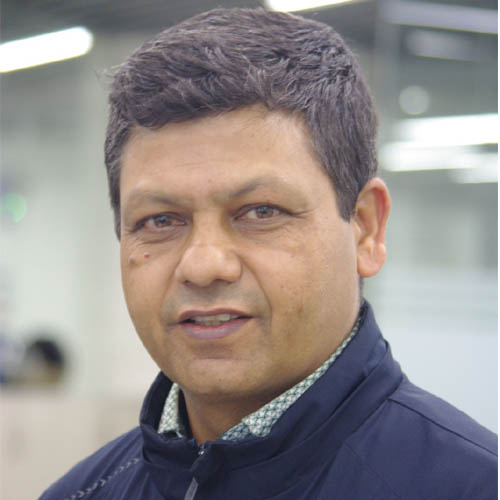Interviews
RSP in favour of functional, economically viable provinces
Santosh Pariyar, chief whip of the Rastriya Swatantra Party, shares insights on the central committee and parliamentary party meeting and its decisions.
Thira Lal Bhusal
The Rastriya Swatantra Party, the fourth-largest in the House of Representatives, convened a joint meeting of its central committee and parliamentary party in Jaleshwar of Mahottari district last week. There, it made some decisions to clarify the party’s line on key political issues. Thira Lal Bhusal of the Post sat with RSP Chief Whip Santosh Pariyar for more insight on the meeting and its decisions.
Your party’s Jaleshwar joint meeting is said to have added clarity to the party’s identity and made some important changes in party leadership. Could you elaborate on those decisions?
Initially, we said we would operate mainly in line with the present constitution but that wasn't enough. A group of leaders in our party kept insisting on more clarity on the party's theoretical line on key political issues. I was one of them. Second, we wanted to expand our central committee and the team of office bearers by including important personalities who have been working in our organisation as lawmakers and in other capacities. Third, we wanted to review our past year’s performance in Parliament and other fronts and chart out a future course.
The meeting endorsed the party’s official lines based on a paper presented by a 17-member team entrusted to offer suggestions about our party’s position on key political issues. Our party is getting more consolidated and more clearly articulating its positions.
But the office-bearers’ team doesn’t look inclusive. What is your opinion?
Yes, it’s true, it doesn’t look very good. A group of leaders including me discussed this matter with the party president on Friday when reviewing public reaction to the party's decisions. We are exploring ways to address it. The party is yet to designate leaders on some positions such as spokesperson. We shouldn't ignore the issue of inclusion under any pretext. When people see more male faces and those from one community in key positions, they will raise questions. Such criticisms are valid because a political party should always be under public scrutiny. We are ready to correct our mistakes.
RSP endorsed the party chief’s conclusion that the provinces are a burden on state coffers and the country needs to find their alternative. Could you explain the bases of this conclusion?
Nepal didn’t adopt federalism in true sense because of political dishonesty. Mainly Nepali Congress and CPN-UML didn’t allow the Constituent Assembly to adopt meaningful federalism as they were guided by a unitary and centralised mindset. Provinces were made weak and are almost dysfunctional. They have failed to connect with the people. It isn't the failure of the federal system but the leaders. In fact, federal and local units are more corrupt than provincial units. But a false narrative against the provinces has been made viral. In this confusion, we want to come up with an idea of implementing an effective federal system. We aren't against federalism. But any state structure should help and facilitate the people. So we saw the need to change how our provinces function.
But the proposal your party has endorsed further weakens provinces. How can you make them effective?
No, it doesn't weaken the provinces. It is as per the constitutional provision that envisions three-tier federalism. We only wanted to make provinces economically viable and more functional whereas traditional parties tried to make them centres to recruit party cadres.
What type of provinces does your party want exactly?
We can downsize the provincial assemblies and their cabinets. Now the provinces are just replicas of the central units. Chief ministers want to be like the prime minister, while provincial ministers want to be like the federal ministers. They want similar vehicles and facilities. This isn’t the type of federal system we wanted. So a change is necessary.
As people have raised questions over provinces, we want to address them by adopting the right form of the system. Almost all political parties are ready to rethink the federal system. By the next election, some may strongly oppose this system itself.
As the party is trying to weaken the provinces, can’t we say it is trying to turn the clock back?
You may see it that way. But we can’t regress and federalism shouldn’t be weakened under any pretext. Two aspects are vital for its success: honest political leadership and efficient bureaucracy. Otherwise, the system won’t work. But we have failed on both counts. We are in a difficult situation.
On federalism, people across the country are swayed by unsubstantiated claims. They attribute all wrongs to it. This is surprising. Federal and local units are more corrupt but people blame provinces. They are misled. When we go to districts, people immediately say provinces should be scrapped. It has also caused confusion in our party. But we are absolutely not for taking a regressive path.
Will the RSP field its candidates for provincial seats in next polls?
We will because we should be in state structures if we want to deliver and serve the people at all levels. Last year, we couldn’t do it because of a lack of preparation. To make our work more effective, we should be in the majority. Federal parliament comprises upper and lower houses. Elections for 19 seats of the Rastriya Sabha will happen next month but we don’t have votes to be elected there as there are no RSP representatives in provincial and local units.
What will be your party’s role in the upcoming upper house elections?
We aren’t in a position for give and take as we don’t have representatives there. But as the fourth largest party in the House of Representatives, we may still have some role. I am in consultation with other political parties.

What is the party’s position on secularism?
We believe that the state should always be secular. It shouldn’t support one religion. An individual can choose one but not the state. The state should be equal to people from all religions. Politics shouldn’t be mixed up with religion.
And is your party open to forging election alliances?
Our policy is clear. We are for competition in elections, and collaboration in the Parliament, government or any other platform. Other parties have adopted a wrong approach. We believe that parties should compete in elections and collaborate in parliament based on issues. Forging alliances in elections is detrimental to democracy. It has already harmed our inclusive system. The presence of women in the chief or deputy chief positions declined this time because of the alliance the parties forged in the last election.
Your party recently concluded a countrywide door-to-door campaign. What were the takeaways?
We were curious about our public perception, particularly our role in Parliament and other platforms. But we are quite excited with the response we got. I was surprised to find people are curiously following all our activities and roles. We were particularly anxious about the perception of the Madheshi people towards us. During our three-day event in Jaleshwar and other brief interactions with Madheshi people, we have been encouraged. They are watching us, as curiously and positively.
But will your party’s new proposal of seeking an alternative to provinces help you make inroads in Madhesh?
We have to clearly explain our proposal to the people. Once we clarify how we want to make provinces less cumbersome and more effective, they will support us. Some may project us as anti-federalists but we will come up with a detailed document that shows that we aren’t. Madheshi people are for provinces but only functioning ones.
Speculations were rife about RSP joining the government. Is there some truth to them?
Given the composition of the present House of Representatives, rumours about the country’s fourth-largest party joining the government are natural. Leaders from the ruling coalition often encourage us to join, saying that we should be in the Cabinet. They come up with formal and informal proposals also with me because as a chief whip of the RSP I often interact with them in the Parliament. But there is no substantive development towards our party joining the government.
RSP had a brief experience in the government. But you have been in the opposition for almost a year now. How different have these experiences been?
You can stay in opposition all the time if you want to do politics just for the heck of it. For that, all you need to do is raise high-sounding, revolutionary and radical voices in Parliament and on the street. But if you really want to work for the people and change the society, you should join the government, formulate policies, make pro-people decisions and deliver. If we accuse others of failing to deliver, we also need to be ready to shoulder the burden and deliver. If those in the government work sincerely, they can definitely make a difference. But for that a political party should get proper space in a government based on its strength in Parliament.
In the last elections, RSP got more votes from urban areas than rural ones. Is your party still stronger in urban hubs?
No. People have a wrong perception. I recently visited various rural parts of the country. RSP is even more popular in remote districts. Our party president is more popular in far-flung villages mainly because of the initiatives he took as a popular television personality before joining politics. Some say RSP is a party of middle-class, upper-middle-class and well-off people. We have good support from this strata. But our support among parents of the youths who have left their villages is amazing too.




 10.12°C Kathmandu
10.12°C Kathmandu




.jpg&w=200&height=120)







